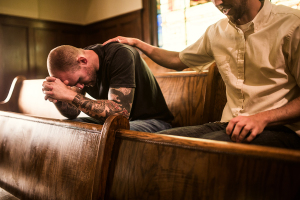What should be the role of women in church? (Part 1)
“Phoebe, a servant of the church in Cenchrea”
Now we come to one of two key passages related specifically to the question of women as deacons. Paul closes Romans 16 with a list of people worthy of commendation, and begins with a woman named Phoebe:
“I commend to you our sister Phoebe, a servant of the church in Cenchrea. I ask you to receive her in the Lord in a way worthy of the saints and to give her any help she may need from you, for she has been a great help to many people, including me” (Romans 16:1-2, NIV).
Most interpreters believe that Paul was living in Corinth or Cenchrea (a coastal town just to the east) when he wrote the letter to the Romans, and that Phoebe helped carry Paul’s letter to its destination. And so the apostle recommends Phoebe to his letter’s recipients with wonderful praise: “she has been a great help to many people, including me” (v. 2).
Germane to our discussion is his first description of Phoebe: “a servant of the church in Cenchrea.” “Servant” translates the Greek word diakonon, the same word translated in 1 Timothy 3:8, 10, 12, 13 and Philippians 1:1 as “deacon.” So, was Phoebe a “deacon” of the church at Cenchrea? If she was, does her position there bear relevance to our discussion now?
Arguments for Phoebe as a “deacon”
Many interpreters are convinced that diakonon in Romans 16:1 should indeed be translated and understood as “deacon,” not “servant.” James Dunn calls Phoebe “the first recorded ‘deacon’ in the history of Christianity.” He maintains that if Paul meant to identify her only as a “servant” he would have used diakoneo (cf. Romans 15:25) or diakonia (cf. 1 Corinthians 16:15). He believes that the phrase “of the church” points to a “more recognized ministry” or “position of responsibility within the congregation.” [1]
A. T. Robertson, one of Baptists’ greatest Greek scholars, agrees: “In favor of the technical sense of ‘deacon’ or ‘deaconess’ is the addition of ‘of the church.’ In some sense Phoebe was a servant or minister of the church in Cenchreae.” [2]
Greek scholar R. C. H. Lenski concludes: “Both the participle and the genitive [“being a servant of the church”] indicate that Phoebe occupied an official position by appointment of the church which was similar to that of the seven deacons who were appointed in the church at Jerusalem (Acts 6:1-6). She belongs to the class indicated by diakonia in 12:7. Her work of ministering was not mere private effort but was carried on by authorization of the congregation. It is only fair to assume that she was not the only one so appointed in Cenchreae; such an appointment was in all likelihood held by several women.”
Lenski adds, “This is the first mention of women deacons in the church. The way in which Paul introduces this deaconess to the Romans indicates that the fact that women serving in this office was not a novelty but something that was already known. While we lack information we must, nevertheless, say that, since the arrangement of having male deacons in Jerusalem had proven highly beneficial at the very start, the appointment of women was the next logical step. The ministration of the first deacons consisted in the distribution of food to widows. But, surely, it must soon have become apparent that, for instance, in cases of sickness and of poverty and of loneliness, especially of poor widows and orphans, a need had arisen for the alleviation of which men could not be used; only competent women could serve in this capacity. Voluntary efforts would accomplish much, and in many churches they, no doubt, sufficed as they still do; but at least here in Cenchreae we see the forward step, the addition of duly appointed deaconesses.”
He concludes, “How the duties of the office were arranged and how it functioned we do not know beyond the one statement that it rendered ministering help for the sake of help. That is the heart of deaconess work today, its present form being a recent arrangement. From 1 Tim. 3:11, which was written a few years later, we see that there were many deaconesses in the Ephesian church; they are simply called ‘women,’ but the qualifications laid down match those required for male deacons.” [3]
F. F. Bruce, the noted evangelical theologian, adds: “In a church context the word should be rendered ‘deacon,’ whether masculine or feminine. That the duties of a deacon could be performed by either men or women is suggested by 1 Timothy 3:11, where ‘the women’ are to be understood as ‘deacons’ (like the men of verses 3-10).” [4] Presbyterian expositor Donald Grey Barnhouse agrees: “The Greek word which tells us that Phoebe was a ‘servant’ of the church is the word for ‘deaconness.'” [5]
Thomas Schreiner, in an essay which takes a decidedly negative view regarding women in church leadership, nonetheless concludes, “In the New Testament, women functioned as prophets and probably deacons but not as elders.”[6]
If Phoebe was a “deacon,” why did Paul use the masculine Greek word for her designation? For the simple reason that “woman deacon” (diakonissa) was not invented until the fourth century. [7] He used the masculine form with the feminine name because it was the only designation for “deacon” available to him.
In conclusion, those who believe that Phoebe was a “deacon” suggest that there is no exegetical reason to exclude her from this ministry office. To the contrary, the Greek syntax seems to indicate that “being a servant of the church” referred to a formal, church-related position rather than a general role of “servant.” [8]
Arguments for Phoebe as a “servant”
Those who believe that Phoebe should not be seen as a “deacon” in the sense we mean the office today can base their interpretation on two different assertions. First, since diakonon or diakonia can mean either “servant” or “deacon,” we must allow the context to determine which definition we will follow. Despite the argument from Greek syntax cited above, some argue that nothing in the context of Romans 16:1-2 requires that diakonon refer to a specific office rather than a servant function.
John Murray asserts: “Though the word for ‘servant’ is the same as is used for deacon . . ., yet the word is also used to denote the person performing any type of ministry. If Phoebe ministered to the saints, as is evident from verse 2, then she would be a servant of the church and there is neither need nor warrant to suppose that she occupied or exercised what amounted to an ecclesiastical office comparable to that of the diaconate. The services performed were similar to those devolving upon deacons. Their ministry is one of mercy to the poor, the sick, and the desolate. This is an area in which women likewise exercise their functions and graces. But there is no more warrant to posit an office than in the case of the widows who, prior to their becoming in charge of the church, must have borne the features mentioned in 1 Timothy 5:9, 10.” [9]
William Barclay agrees: “Sometimes she is called a deaconess, but it is not likely that she held what might be called an official position in the Church.” [10]
A second argument against Phoebe as a “deacon” asserts that the “office” of deacon or deaconess was less developed in the first century than it evolved to become in succeeding generations. James Dunn, while arguing that Phoebe was indeed a “deacon” of the church, adds that “it would be premature to speak of an established office of diaconate, as though a role of responsibility and authority, with properly appointed succession, had already been agreed upon in the Pauline churches. We are still at the stage of ministry beginning to take regular and formal shape . . . and the form in each case would depend very much on the context and needs of particular congregations.” [11]
For these reasons, some interpreters are not certain if we should consider Phoebe to be a deacon or not. Robert Mounce concludes, “it is not certain whether this is an official title or a description of what she did.” [12] James Denney agrees: “It is not easy to translate diakonos, for ‘servant’ is too vague, and ‘deaconess’ is more technical than the original. Diakonia was really a function of membership in the Church, and Phoebe might naturally be described as she is here if like the house of Stephanas at Corinth (1 Corinthians 16:15) she had given herself ‘unto the service of the saints.’ That is, a life of habitual charity and hospitality, quite apart from any official position, would justify the name diakonos. On the other hand it must be remembered that the growth of the Church, under the conditions of ancient society, soon produced ‘deaconesses’ in the official sense, and Phoebe may have had some recognized function of diakonia assigned to her.”[13]
Everett Harrison is similarly ambivalent: “Phoebe is called a ‘servant’ of this church. The same word can be rendered ‘deaconess’ (RSV, JB). Men were serving as deacons about this time (Phil 1:1), and before long women were being referred to in a way that suggests they held such an office in the church (1 Tim 3:11), though the word ‘deaconess’ is not used in that passage. In any event, Paul is not stressing office but service, as we gather from v. 2.” [14]
My position: Phoebe was in fact a female “deacon,” not simply a “servant” of the church in Cenchrea. I agree with Dunn that Paul’s vocabulary points to an office more than a function, and that the syntax of his phrase indicates that she served in an official capacity within the church at Cenchrea.



























